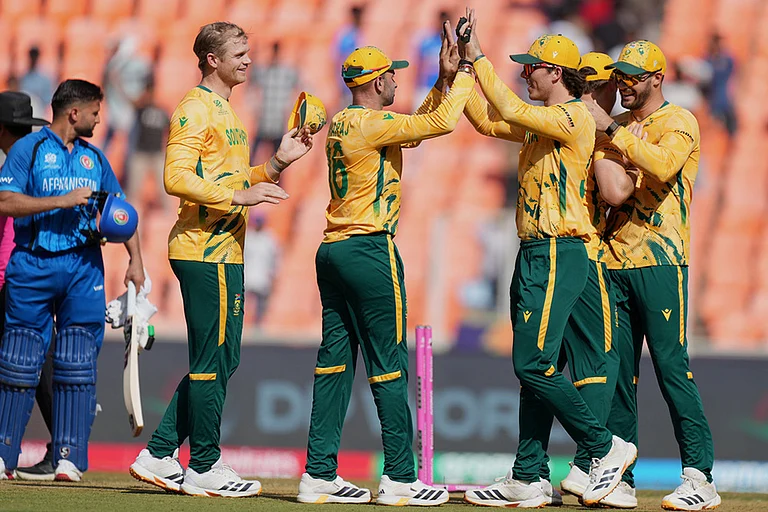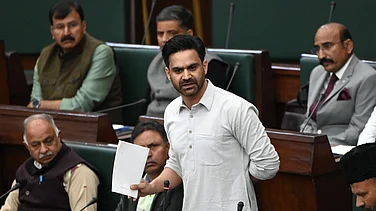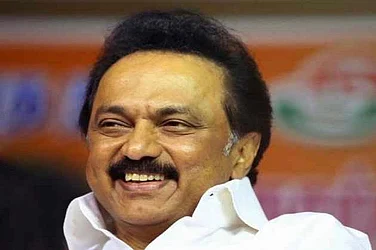THE last nine months have been a strange flip-flop-ping period for Dr Manmohan Singh. As the Congress crumbled in the Lok Sabha elections, many partymen blamed Singh's economic policies for the defeat. For some months, it looked like the quiet sardar's public career was over. In the only interview he gave in those days (Outlook, July 24, 1996), he sounded bitter and said he would now focus on writing his autobiography.
Then came Sitaram Kesri, and Singh was made a member of the Congress Working Committee and shadow finance minister to keep close watch on the United Front (UF) Government's economics. For a brief moment there was even a whisper that Manmohan may be projected as the Congress prime ministerial candidate—after all, his honesty was beyond doubt and corruption charges were what was hounding the Congress.
If that was the flip, the flop came immediately after. Suddenly again, Singh appears to have been relegated to the wilderness by his party. No one apparently is sure of his status and clout, and there have been Congress voices carping that the UF Government was moving too fast along the reforms path, while Singh's stand has been diametrically opposite.
What may have happened is that Congress' main aim today is to reorganise and revitalise the party. While economic policies are important, explains Congress spokesman V.N. Gadgil, the party's priorities at the moment are elsewhere: on clearing confusion amongst the rank and file. It's simply a question of first things first, he says.
"The main issue before the party is to fight communalism," says Rajesh Pilot. Corruption and ideological differences have weakened the party's base, and these issues have to be tackled immediately. Economic issues will have to wait. So will Dr Singh.
Other party leaders feel that Singh's talents are too limited for the party's commanding heights. He is and will remain a man of economics; beyond that the Congress has no place for him. They believe in most party matters, even economic, Singh does not have much of a say and is gradually moving into political oblivion. And despite his elevation as a CWC member, Singh will remain a mere showpiece as most Congressmen feel that despite his six-year association with the party, Singh is yet to graduate to the subtle art of politics.
As of now, after what appeared to be an era of increasing returns for the party, the Congress party seems to believe that the M-factor is now one of diminishing utility. Officially, though, the good economist is firm in his place. And he is quick to insist that the Congress' economic policies remain what he enunciated as finance minister. In fact, he isn't writing his autobiography right now because he feels that he can still make a contribution to his party and the nation. And his harshest words he reserves for the UF's economic policies. But he definitely does not want to be finance minister again.
How do you rate the performance of the economy under the United Front?
It is an indifferent performance. The UF Government has not been able to fulfil its promises. It has not been able to cash in on the opportunity to lift the economy further after the Congress government had successfully turned it around.
When the UF's Common Minimum Programme (CMP) was drafted and announced with much fanfare, I had complimented them on their intentions. I did not and do not agree 100 per cent with what the CMP said but it had its positives. But unfortunately, the Government has not been able to do what it said it would do.
With the kind of intentions laid down in the CMP, the country expected the Government to perform much better. It has not been able to cash in on the favourable situation it inherited from the Congress government. It inherited very strong economic fundamentals. It inherited a huge foodgrain stock and there was no need to raise food prices. Same is in the case of the oil pool account. It only shows its failure to manage the economy.
Frankly, the Government is acting as if it's in an election year. Everything is looking down now and investor confidence is at one of its lowest points. There is a slump in financial institutions' investment and in savings and now one has to worry about the sustainability of a GDP growth rate of about 7 per cent.
Is the economy marching backwards or is it on an even keel?
There is no marching backwards and neither can we say that it is on an even keel, but it is certainly growing. And the Indian economy is growing only because of the momentum set by our government through its policies. It is not because of the policies of the present Government. And it will continue to grow due to our policies only. If the economy has some standing now, it is because of what the Congress government did to it and not for what the present Government did not do for nine-odd months. The current ditherings over policy and multiple statements will take it nowhere.
What are the compulsions facing the economy and which of them are lying unattended?
The imperatives are quite clear. The UF inherited a very good economy with a prosperous and positive approach, when they came to power in June 1996. There had been a high growth for two consecutive years in 1994-95 and 1995-96, exports were growing at 20 per cent, investment was increasing and so were savings and foreign exchange reserves were high. This was the time when the UF could have and should have launched a movement forward in the economy. They failed to do so as they failed to pay attention to areas which were crying to be looked into.
As a result, there are many unresolved issues lying open before the UF without which the economy cannot move forward. There is an urgent need to give infrastructure management a big boost. The issues in most infrastructure sectors which are the mainstay of the economy remain unresolved today. We had taken export growth to 15 to 20 per cent in dollar terms and this much is required if there is any aim of glob-alisation. Export growth today is of 10 per cent or maybe even lower. It remains unresolved. So also the issue of sick public sector undertakings, despite promises. Macroeconomic fundamentals are also becoming shaky. The fiscal deficit is posing a problem. We had brought inflation down to timid levels; it's raising its head again. The question of combining rapid growth with inflation management is not being looked into. The Government is rather complacent about inflation management and other important issues like the food policy. The UF has to act fast to set investment up and move forward towards globalisation.
What should be the general direction of the Budget?
The Budget should say what they speak. The Budget should carry out the promises they made to the people and in the CMP. They should take steps to bring the fiscal deficit down to 4 per cent. They should carry out overall macro-economic reforms and complete the process of tax reforms which the country needs badly. The aim should be to create a macro-economic environment conducive enough for a GDP growth rate of at least 7 per cent. Primarily, it has to regain the confidence of the people that the Government has policies and programmes and is capable of sustaining a growth rate of that stature at a time when people's and investors' confidence about the economy and about the Government's stability and capability to reform it is very low.
Despite the pro-poor slant, the common man is reeling under price increases. The imminent rise in petroleum prices which will have a cascading effect will add to his woes. What is the way out?
I share the concern of the people that prices are already high and are increasing. Food prices, despite excellent stock position at the end of the Congress rule, have been on the rise. This is primarily because there is no clear thinking in the UF Government about key issues. In fact, there is a lack of clarity which one has not seen for many years. Take the case of PDS revamping. Despite several promises and statements by ministers, what has the Government done about PDS? Nothing. The Government has no clear thinking about the food policy. At this point, the last thing that the country can afford is a food crisis. On the petroleum front too, there is confusion. If prices have to be raised, they have to be raised. The country cannot afford a situation where petroleum is priced such that the oil companies go on sustaining losses.
How do you rate Chidambaram's performance as finance minister? Do you agree with his line of action?
I would not like to judge personal traits of any minister.
What about Murasoli Maran as industry minister?
Maran is doing a good job and is very clear about his actions as industry minister and his freedom to work in this manner is important.
Did you face some hostility in the party after the Lok Sabha debacle?
No. There is no question of facing hostility after the Congress' performance in the election. It was the party's performance, and I cannot be blamed for the party's debacle. If I faced any hostility, I would not be in the Congress Working Committee and the Economic Monitoring Committee and the Congress would not propose my name for chairmanship of the Standing Committee on Commerce.
What is the current Congress economic thinking?
The Congress stands by its earlier policy which reformed the country's economy. But for that policy, the country's economy would have gone to pieces. It stands by its policy of reform, liberalisation and globalisation which saved the country from an economic, social and political disaster.
Economic policy has been one of the biggest plus points for the Congress and it will remain so. We will continue to advocate liberalisation and lobby for a logical continuation of the economic reforms. Our thinking is the same as before and will not change.
How do you assess your five years as finance minister?
It is for others to assess and say. We did what we wanted to do. We successfully converted a grave economic crisis into an opportunity for a leap forward. When we came in, everything was wrong and when we left, things were more than right. We came in with an unsustainable Balance of Payments position and a GDP growth rate of around 3.5 per cent, low export growth, inflation surging at 17 to 18 per cent and sagging foreign exchange reserves. When we left, export growth was high at 20 per cent in dollar terms, inflation was low at below 4 per cent, foreign exchange reserves exceeded $20 billion and India's credit rating was higher than ever. The economic policies enhanced growth capabilities and India's prestige in the world. We stepped into a high growth arena from nowhere within those five years.
You had said once that you planned to write a book on this....
I am not writing an autobiography now. I believe I still have some useful contribution to make to the country, to the economy and to the party. When I am through with all that and have nothing more to offer, I will concentrate on my autobiography.
You are a full-time politician. Are you comfortable in your new avatar?
Yes. I am satisfied and I am enjoying this new avatar very much.
What about teaching at the Delhi School of Economics?
I do go there to give lectures. I am also on the Board of Trustees of the Institute of Economic Growth and other academic institutions. I will continue this as an intermingling of economics and academics is good.
Given an opportunity, would you like to become finance minister again?
No, never. I do not want to go back to the same seat again. I have spent enough time as finance minister and done what I could have done for the country.
For a moment, everyone was looking towards you as the prime ministerial candidate.
I have no such ambition. People have been thinking many things and they have the freedom to do so.
What do you do in your spare time?
I have no spare time between academics and economics. Whatever is left is taken away by politics.






















